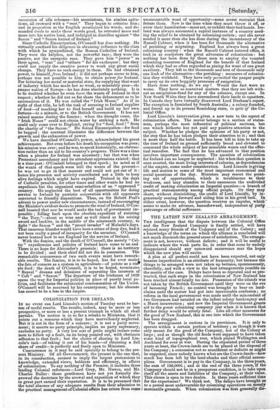COLONIZATION FOR IRELAND.
lit no event can Lord Lincoln's motion of Tuesday next be bar- ren of useful results. The results, indeed, may be more or less prospective, or more or less a present triumph in which all shall partake. The motion is in so far a rebuke to Ministers, that it points out a resource which they have marvellously neglected. But it is not in the form of a censure; it is not a party move- ment; it asserts no party principle, implies no party supremacy, excludes no party. A very low sort of pride might include some men to follow up a fault, on its being pointed out, with obstinate adhesion to that fault ; but the choice of sharing. in Lord Lin- coln's task—of taking it out of his hands—of obtaining a full share of credit—is perfectly and freely open to Ministers.
Concurrence in It may be said specially to belong to the pre- sent Ministry. Of all Governments, the present is the one that, in its construction, seemed to imply the largest pretensions to knowledge, extended views, boldness and efficiency, in affairs of colonization. To say nothing of the Premier, it includes three lading Colonial reformers—Lord Grey, Mr. Hawes, and Mr. Charles Buller : those gentlemen have not yet formally dis- avowed the doctrines by the avowal and exposition of which they in great part earned their reputation. It is to be presumed that the total absence of any adequate results from their admission to the practical management of Colonial affairs has arisen from some
unaccountable want of opportunity—some secret restraint that fetters them. Now is the time when they must throw it off, or avow their humiliation—must act, or exhibit their tied hands. Ire- land was always accounted a capital instance of a country need- ing the relief to be obtained by colonizing outlets ; and she never needed it more than she has done during the incumbency of the Russell Cabinet, when it has been for thousands the alternative of perishing or migrating. England has always been a great colonizing country : when the Russell Cabinet entered office, it took in as coadjutors the great advocates of colonization : but nothing has been done by those men to employ the vaunted colonizing resources of England for the benefit of that Ireland which they had so often regarded as pining for want of one great auxiliary. They left to the thousands and tens of thousands only one limb of the alternative—the perishing : measures of coloniza- tion they withheld. They have only permitted the pauper people to carry on its own beggarly processes of emigration. Have done nothing, do we say ? Would the fact were no worse. They have so contrived matters that they are left with- out an emigration-fund for any of the colonies except one. In New South Wales they have surrendered their lands to squatters. In Canada they have virtually disavowed Lord Durham's report. The exception is furnished by South Australia; a colony founded, and forced up to its present flourishing state, in spite of the Co- lonial Office.
Lord Lincoln's intervention gives a new turn to the aspect of colonization affairs. The mover belongs to a section of states- men, perhaps the most influential of political sections, but one which hitherto has not paid any positive attention to the subject. Whether he pledges the opinions of his party or not, the step that he has taken pledges their attention to it ; and that is more than half the battle. It has been left to him to take up the case of Ireland on ground sufficiently broad and elevated to command the whole subject of her miserable wants and the effec- tual remedies. The fact that he has advanced to that position involves important consequences. The question of colonization for Ireland can no longer be neglected : but when that question is once mooted, the most living interests of colonies, as dependencies of the empire, come under consideration. Lord Lincoln is giving life and motion to some of the most important economical and social questions of the day. Ministers may resent the point- ing out of opportunities, which is troublesome to their weakness, and may abandon to their successors the undivided credit of making colonization an Imperial question—a branch of practical statesmanship among official people. Or they may share, without diminishing, the credit of Lord Lincoln, by in- genuously coming forward and aiding him in his great task. In either event, however, the question receives an impulse, which' seems to make its advance, henceforward, independent g party patronage or official sufferance.


























 Previous page
Previous page